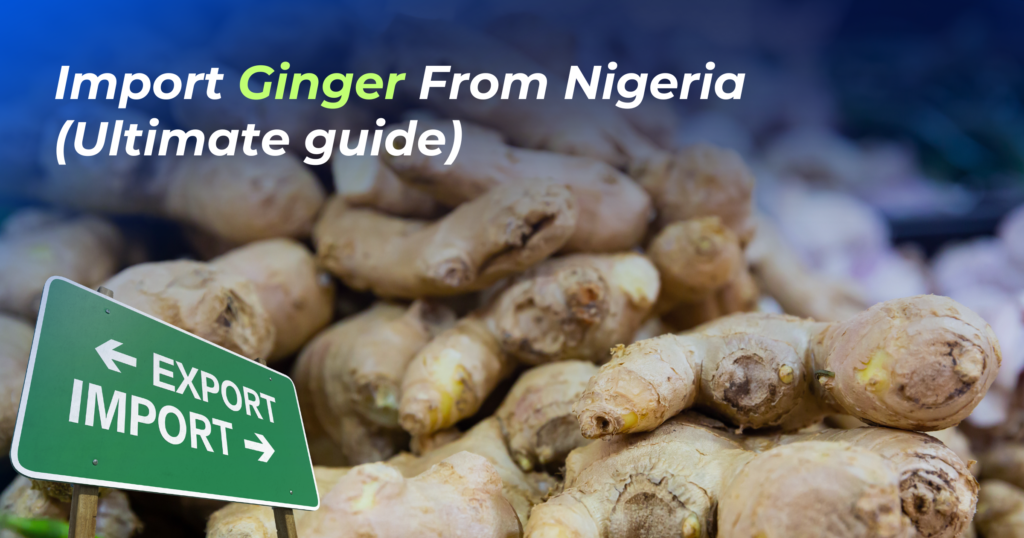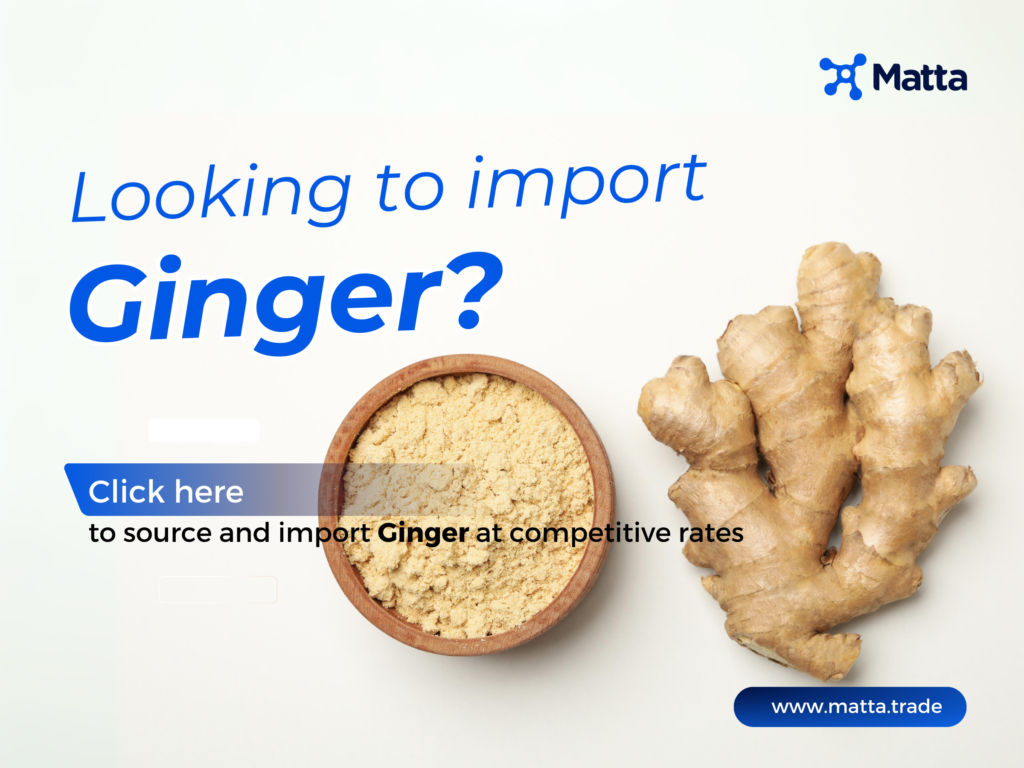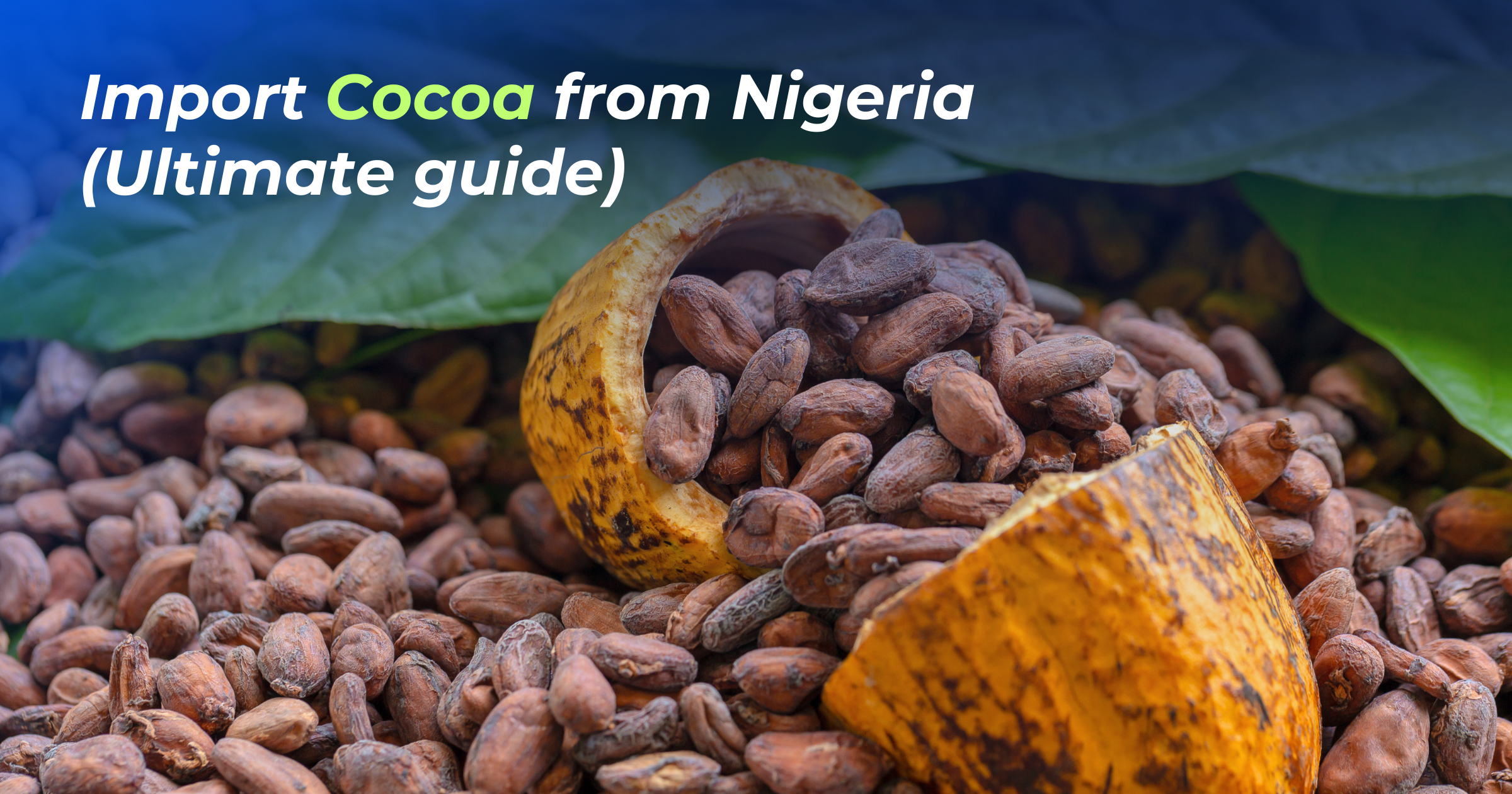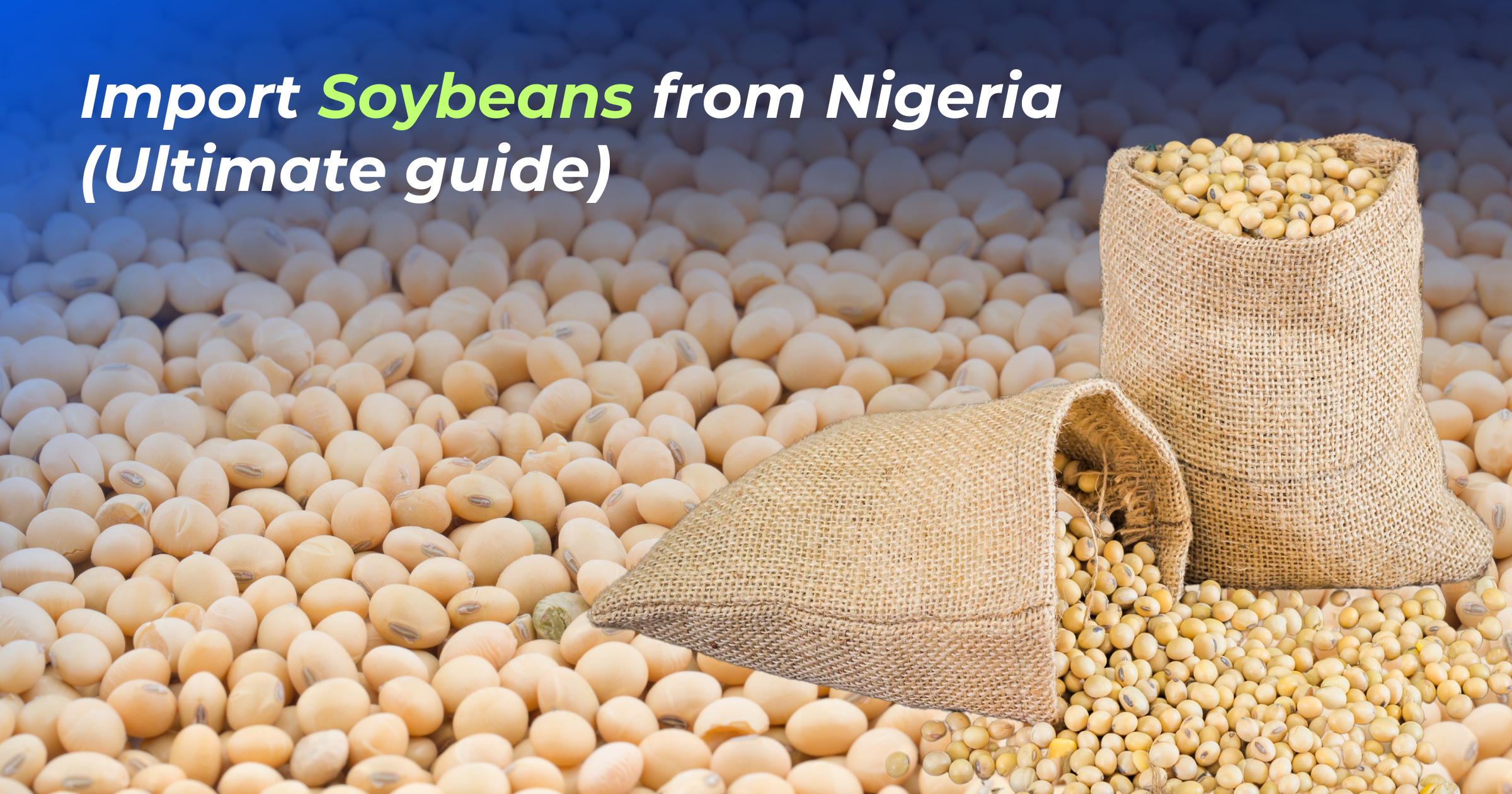
Nigeria, renowned for its rich agricultural heritage, has emerged as a pivotal player in the global spice market, particularly in the production and export of ginger. This robust, versatile spice, known for its distinctive flavour and myriad health benefits, has seen its demand soar in recent years. In this article, we delve into the intricacies of the Nigerian ginger market, offering a comprehensive guide for potential exporters and importers.
Ginger is a versatile spice and medicinal herb that has gained global recognition for its culinary and medicinal properties. Originating in Southeast Asia, ginger has spread across continents, reaching countless cuisines and traditional healing practices. Today, Nigeria is a leading ginger producer and exporter, supplying the global market with this sought-after commodity.
This comprehensive guide delves into ginger importation from Nigeria, providing insights into the industry, regulatory framework, and strategies for successful procurement. Whether you’re a seasoned importer or a newcomer to the ginger trade, this guide will equip you with the knowledge and expertise to navigate the complexities of this dynamic sector.
The Science Behind Nigerian Ginger’s Exceptional Quality
Nigerian ginger stands out from the crowd due to a unique combination of factors, from its geographical origins to its cultivation practices. This combination contributes to the spice’s exceptional quality, flavour profile, and nutritional value. Let’s evaluate these factors and understand how they equate to Nigeria’s high-quality ginger.
Geographical Factors
Nigeria’s distinct geographical features also play a significant role in shaping the characteristics of its ginger. The country’s tropical climate, characterised by warm temperatures, abundant sunlight, and regular rainfall, provides ideal conditions for ginger cultivation. These conditions foster the growth of ginger rhizomes with higher levels of volatile oils, including gingerol and shogaol, responsible for the spice’s intense aroma and flavour.
Cultivation Practices
Nigerian ginger farmers employ traditional and modern cultivation practices contributing to the spice’s exceptional quality. These practices include:
- Selection of High-Quality Ginger Cultivars: Nigerian farmers carefully select ginger cultivars well-suited to the local climate and soil conditions. These cultivars are known for their robust flavour and high oleoresin content.
- Soil Management: Nigerian ginger farmers maintain healthy and fertile soil conditions essential for producing high-quality ginger. They practice proper fertilisation, irrigation, and crop rotation to ensure the soil’s nutrient balance and prevent soil degradation.
- Post-Harvest Handling: Proper post-harvest handling is crucial for maintaining the quality and freshness of ginger. Nigerian farmers prioritise careful harvesting, cleaning, packaging, and storage to ensure that ginger rhizomes reach their destination in optimal condition.
Nutritional Profile of (Nigerian) Ginger
Nigerian ginger is a rich source of essential nutrients, including vitamins, minerals, and antioxidants. These nutrients contribute to the spice’s health benefits, such as its anti-inflammatory properties and ability to boost immunity.
- Vitamins: Ginger is a good source of vitamins C, B6, and A, essential for various bodily functions, including immune system support, collagen production, and vision health.
- Minerals: Ginger contains potassium, magnesium, calcium, and manganese, which are crucial for maintaining muscle function, bone health, and nerve signalling.
- Antioxidants: Ginger is packed with antioxidants, such as gingerol and shogaol, which protect cells from damage caused by free radicals and may lower the risk of chronic diseases.
Overall, Nigerian ginger’s exceptional quality is attributed to geographical factors, cultivation practices, and nutritional profile. Lastly, the spice’s unique flavour, aroma, and health benefits make it a valuable ingredient in culinary and medicinal applications.
Nigeria’s ginger industry boasts a rich history, dating back to the introduction of spices by Arab traders centuries ago. Over time, ginger cultivation flourished nationwide, particularly in the northern and central regions. Nigeria is among the top ginger-producing nations globally, with an estimated annual output of over 400,000 metric tons.
A Comprehensive Overview of Nigeria’s Ginger Industry
Nigeria’s ginger industry has grown rapidly, contributing about 5% to the global ginger market, which was valued at over $3 billion in 2021. With rising global demand, especially for ginger’s medicinal properties, Nigeria’s market share is expected to grow further.
The primary ginger-growing regions—Kaduna, Kano, Plateau, Taraba, and Benue—offer warm temperatures, well-drained soils, and adequate rainfall, ideal for ginger cultivation. Nigeria produces two main varieties: white ginger (white rhizome) and black ginger (black rhizome). White ginger is the most commonly exported, known for its strong flavour and high oleoresin content, while black ginger is valued for its earthy taste and use in traditional medicine.
Nigeria’s annual ginger output now exceeds 400,000 metric tons, driven by government support, expanded cultivation, and improved farming practices like organic fertilisers and pest control. As a result, Nigeria has become the world’s second-largest ginger exporter, with exports valued at over $42.5 million in 2017.
Furthermore, global demand for ginger is rising, fuelled by awareness of its health benefits, increased culinary use, and demand from the pharmaceutical and cosmetic industries. Nigerian producers are diversifying into value-added products like dried ginger, ginger powder, and ginger oil, capturing more value in international markets.
However, challenges remain. Post-harvest losses reduce exportable volumes, limited processing capacity hinders value-added production, and infrastructure issues complicate efficient transportation and storage. Addressing these challenges through improved infrastructure and processing facilities will unlock further growth opportunities.
With its favourable climate, expanding production, and increasing exports, Nigeria’s ginger industry is well-positioned to thrive in the global market.
Addressing these challenges could further enhance the competitiveness of the Nigerian ginger sector and unlock new opportunities for growth and development.
An Overview of Nigerian Ginger Exports
Nigeria stands out as a leading exporter of ginger, with its products reaching various global markets. The European Union (EU) is the largest export destination, accounting for over 50% of Nigeria’s total ginger exports. Key EU importers include Germany, the Netherlands, and the United Kingdom. Following closely is the United States, which imports around 20% of Nigeria’s ginger. Asian countries like India, China, and Indonesia also play significant roles in importing Nigerian ginger, while other regions, including the Middle East, Africa, and South America, contribute to the export landscape.
With over 400,000 metric tons of ginger exported in 2021, Nigeria boasts a strong export orientation, making it a net exporter. This dynamic presents numerous benefits for businesses looking to import ginger from Nigeria.
Firstly, Nigerian ginger is renowned for its distinctive quality and flavor. Its robust taste and high oleoresin content stem from the country’s unique climatic conditions and fertile soils. Many Nigerian farmers utilize organic farming practices, ensuring a natural and chemical-free product that appeals to health-conscious consumers.
Moreover, competitive pricing structures enhance the attractiveness of Nigerian ginger. The efficient production practices and government support initiatives keep costs low, allowing importers to access high-quality ginger without excessive expenses.
Additionally, Nigeria offers varietal diversity, producing several ginger types that cater to different consumer preferences. Its scalable supply ensures a consistent volume, making it ideal for businesses.
Furthermore, Nigeria’s robust export infrastructure, including dedicated processing facilities and efficient transportation networks, guarantees seamless logistics. Embracing organic and sustainable practices further elevates Nigeria’s reputation in the international market, allowing importers to meet the growing demand for environmentally responsible products. Ultimately, importing ginger from Nigeria not only diversifies supply sources but also enriches product offerings with unique cultural and culinary attributes.
Nigerian Government Support for Ginger Industry Growth
Lastly, the government actively supports the ginger industry through various initiatives, including providing subsidies for ginger cultivation, promoting ginger exports, and facilitating access to finance for ginger farmers, thus enhancing the competitiveness of Nigerian ginger in the global market.
Analysing Nigerian Ginger Value Chain
Value chain analysis is a framework for understanding the sequence of activities and relationships involved in producing and distributing a product. It helps identify the stakeholders, their roles, and the key factors influencing the value chain.
The ginger value chain surround the various stages of bringing ginger from the farm to the consumer. It can be broadly divided into five main stages:
- Input Supply: This stage involves the production and supply of inputs required for ginger cultivation, such as seeds, fertilisers, and pesticides.
- Production: This stage encompasses the cultivation of ginger, including planting, weeding, irrigation, and harvesting. Ginger is typically grown in tropical and subtropical regions with dragging soils and adequate rainfall.
- Post-Harvest Handling: This stage involves the collection, transportation, cleaning, sorting, and storage of ginger. Proper post-harvest handling practices are crucial to maintaining ginger’s quality and shelf life.
- Processing: This stage involves transforming ginger into various forms, such as dried ginger, ginger powder, and ginger oil. Processing methods vary depending on the desired end product and market requirements.
- Marketing and Distribution: This stage involves the promotion, sale, and distribution of ginger to various market channels, including retailers, food manufacturers, and pharmaceutical companies.
Key Stakeholders in Ginger Value Chain
- Farmers: Farmers are the primary producers of ginger and play a crucial role in the value chain.
- Input Suppliers: Input suppliers provide essential inputs for ginger culture, such as seeds, fertilisers, and pesticides.
- Traders and Exporters: Traders and exporters facilitate the movement of ginger from producers to domestic and international markets.
- Processors: Processors transform ginger into various forms, such as dried ginger, ginger powder, and ginger oil.
- Retailers: Retailers sell ginger products to consumers through various channels, such as supermarkets, grocery stores, and online platforms.
- Food Manufacturers: Food manufacturers use ginger in various food products, such as beverages, confectionery, and condiments.
- Pharmaceutical Companies: Pharmaceutical companies use ginger as an ingredient in herbal remedies and medicinal products.
Factors Influencing Ginger Value Chain
- Production: Weather conditions, pest and disease outbreaks, and access to agricultural inputs can significantly impact ginger production.
- Demand: Global demand for ginger is driven by its edible and medicinal applications and consumer preferences for natural and organic products.
- Trade Policies: Government policies, such as export incentives and tariffs, can affect the competitiveness of ginger in the international market.
- Infrastructure: Transportation networks, storage facilities, and access to finance are crucial for ensuring efficient ginger production, processing, and distribution.
- Technology: Technological advancements in cultivation practices, processing methods, and quality control can enhance the competitiveness of ginger.
Strategies for Enhancing Ginger Value Chain
- Promote sustainable agricultural practices: Encourage farmers to adopt sustainable practices that improve soil health, reduce pesticide use, and minimise environmental impact.
- Strengthen post-harvest handling and storage facilities: Invest in infrastructure that improves post-harvest handling practices and storage facilities to reduce post-harvest losses and maintain ginger quality.
- Invest in processing technologies: Support the development and adoption of advanced processing technologies to produce value-added ginger products, such as dried ginger, ginger powder, and ginger oil.
- Promote ginger’s medicinal properties: Conduct research and education campaigns to highlight the medicinal properties of ginger and expand its use in herbal treatments and pharmaceutical products.
- Expand market access: Facilitate access to domestic and international markets for ginger products through trade promotion activities and market connections.
By addressing these factors and implementing effective strategies, stakeholders can enhance the ginger value chain’s efficiency, sustainability, and profitability, ensuring a prosperous future for this global commodity.
Regulatory Framework for Ginger Export from Nigeria
The export of ginger from Nigeria is governed by a comprehensive regulatory framework that ensures product quality, compliance with international standards, and adherence to export procedures. The key agencies overseeing ginger exports include:
- Nigeria Export Promotion Council (NEPC): The NEPC promotes exporting Nigerian agricultural products, including ginger. It provides guidance and support to exporters, facilitates access to international markets, and promotes compliance with export regulations.
- Standards Organisation of Nigeria (SON): SON is responsible for setting and enforcing quality standards for Nigerian exports, including ginger. It conducts inspections and issues certificates of conformity to ensure that exported ginger meets international standards.
- National Agency for Food and Drug Administration and Control (NAFDAC): NAFDAC regulates the production, importation, and exportation of food and drugs, including ginger. It ensures that exported ginger is free from toxins and adheres to food safety regulations.
Identifying Reliable Ginger Exporters in Nigeria
Locating reliable ginger exporters in Nigeria is crucial for successful importation. Several strategies can be employed to find reputable suppliers:
- Online platforms: Numerous platforms like Matta connect ginger exporters with international buyers. These platforms provide access to supplier profiles, product information, and customer reviews.
- Trade associations: Ginger exporters, such as the Ginger Growers Association of Nigeria (GIGAN), often join trade associations. These associations can provide a list of reputable exporters and connect buyers with potential suppliers.
- Industry networks: Attending industry events and conferences can provide opportunities to network with ginger exporters and establish valuable business connections.
When evaluating ginger exporters, consider the following factors:
- Experience: Choose exporters with a proven track record of providing high-quality ginger to international markets.
- Certifications: Ensure exporters have the necessary certifications, such as organic and Good Agricultural Practices (GAP) certifications.
- Reputation: Seek recommendations from other importers or industry experts to assess the exporter’s reputation and reliability.
- Product quality: Request samples of the exporter’s ginger to evaluate its quality, appearance, and consistency.
Ginger Procurement and Logistics
Ginger procurement involves understanding Nigeria’s harvesting and post-harvest handling practices and establishing clear communication and negotiation channels with suppliers.
Harvesting of ginger in Nigeria typically occurs between September and November. Ginger rhizomes are carefully dug, washed, and moved to processing facilities. Processing includes cleaning, peeling, slicing, and drying. Drying is crucial in ginger preservation, ensuring a long shelf life and maintaining its quality.
Procurement considerations for ginger imports include:
- Ginger varieties: Choose those that align with your culinary or medicinal applications. White ginger is the most common variety gets export from Nigeria, but black ginger offers a unique flavour and medicinal properties.
- Specifications: Specify the desired size, shape, colour, and cleanliness of the ginger rhizomes.
- Quantity: Determine the quantity of ginger required based on your business needs and market demand.
- Pricing: Negotiate favourable prices with suppliers while ensuring they are competitive with market rates.
Logistics planning for ginger imports involves:
- Packaging: Select appropriate packaging materials to protect ginger rhizomes during transportation. Consider factors such as moisture protection, ventilation, and weight distribution.
- Transportation: Arrange for efficient and timely transportation of ginger from Nigeria to your intended destination. Airfreight is often the preferred mode for high-value, time-sensitive ginger shipments.
- Freight forwarding arrangements: Engage the services of a reputable freight forwarder to manage the entire transportation process, including customs clearance, documentation, and insurance.
Navigating Customs Procedures and Import Regulations
Importing ginger from Nigeria involves compliance with various customs regulations and import requirements. This includes:
- Import tariffs: Understand the applicable import tariffs, duties, and taxes on ginger imports. Nigeria’s import duty for ginger is typically around 5%.
- Harmonized Tariff Schedule (HTS) code: Classify ginger under the appropriate HTS code, 07071300 for ginger root.
- Import documentation: Prepare the necessary import documentation, including a customs declaration, invoices, and certificates of origin. Ensure all documentation is accurate and complete.
- Customs clearance procedures: Comply with customs clearance procedures, which involve presenting documentation, paying duties and taxes, and obtaining necessary permits.
- Customs brokers and freight forwarders: Engage the services of reliable customs brokers and freight forwarders to assist with customs clearance, documentation, and shipment formalities.
Strategies for Successful Ginger Importation from Nigeria
To achieve successful ginger importation from Nigeria, consider the following strategies:
- Building solid relationships: Establish long-lasting relationships with reputable ginger exporters in Nigeria. These relationships foster trust, open communication, and preferential treatment.
- Conducting thorough due diligence: Conduct thorough due diligence on potential suppliers and products. Evaluate their experience, certifications, reputation, and product quality.
- Negotiating favourable prices and payment terms: Negotiating favourable prices and payment terms with suppliers. Consider factors such as the quantity, quality, and delivery schedule.
- Ensuring timely delivery and adherence to quality specifications: Specify clear delivery deadlines and quality requirements in contracts. Monitor shipments closely to ensure timely delivery and adherence to specifications.
- Complying with all customs regulations and import requirements: Adhere to all applicable customs regulations and import requirements. Seek assistance from customs brokers and freight forwarders when necessary.
Wrapping up…
Nigeria’s ginger industry undoubtedly offers many opportunities for businesses to import high-quality ginger. By understanding the industry dynamics, navigating regulatory frameworks, and implementing effective procurement strategies, importers can well establish successful partnerships with Nigerian ginger exporters and reap the benefits of this vibrant market. As global demand for ginger rises, Nigeria is poise to play an increasingly prominent role in supplying this valuable spice to the world.



